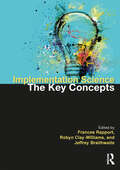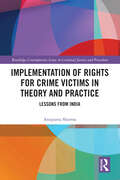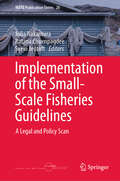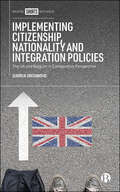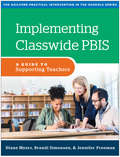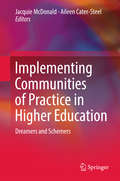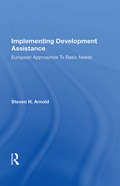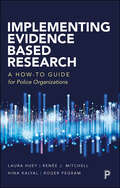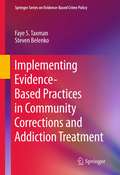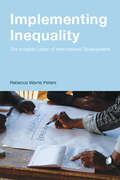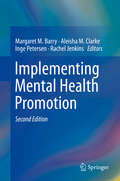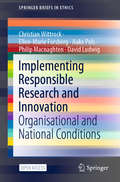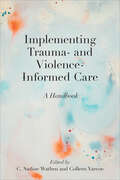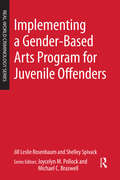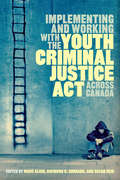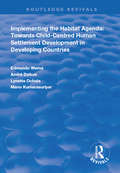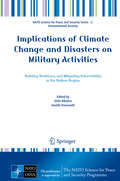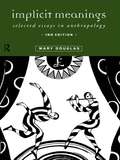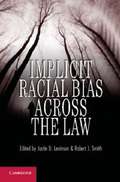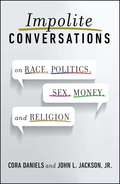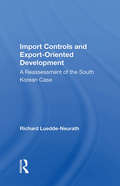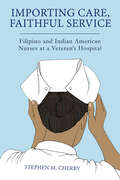- Table View
- List View
Implementation Science: The Key Concepts (Routledge Key Guides)
by Jeffrey Braithwaite Frances Rapport Robyn Clay-WilliamsThis accessible textbook introduces a wide spectrum of ideas, approaches, and examples that make up the emerging field of implementation science, including implementation theory, processes and methods, data collection and analysis, brokering interest on the ground, and sustainable implementation. Containing over 60 concise essays, each addressing the thorny problem of how we can make care more evidence-informed, this book looks at how implementation science should be defined, how it can be conducted, and how it is assessed. It offers vital insight into how research findings that are derived from healthcare contexts can help make sense of service delivery and patient encounters. Each entry concentrates on an important concept and examines the idea’s evidence base, root causes and effects, ideas and applications, and methodologies and methods. Revealing a very human side to caregiving, but also tackling its more complex and technological aspects, the contributors draw on real-life healthcare examples to look both at why things go right in introducing a new intervention and at what can go wrong. Implementation Science: The Key Concepts provides a toolbox of rich, contemporary thought from leading international thinkers, clearly and succinctly delivered. This comprehensive and enlightening range of ideas and examples brought together in one place is essential reading for all students, researchers, and practitioners with an interest in translating knowledge into practice in healthcare.
Implementation of Rights for Crime Victims in Theory and Practice: Lessons from India (Routledge Contemporary Issues in Criminal Justice and Procedure)
by Anupama SharmaThere are many different ways in which victims’ rights can be implemented. The implementation pattern may vary depending on the type of rights a jurisdiction offers and the purposes it seeks to achieve via these rights. However, there are a few basic aspects that remain common to the variation in the implementation patterns across jurisdictions. This book provides a theoretical and practical overview of such implementation patterns, their features and underlying differences. It presents theoretical models capturing the different types of implementations of victims’ rights and the purposes that they can achieve. The book also offers a framework comprising the essential aspects involved in implementation of rights such as drafting and presentation, their visibility and accessibility to victims, enforcement of rights in case of breach, and assessment and evaluation of rights to ensure constant monitoring and improvement in implementation. The framework is tested by a sample case study in New Delhi, India, which showcases how the framework can be molded and applied to assess the existing implementation of victims’ rights and the scope for reform. The book will be of interest to those working in the areas of criminal justice, criminal procedure, victimology and human rights.
Implementation of the Small-Scale Fisheries Guidelines: A Legal and Policy Scan (MARE Publication Series #28)
by Svein Jentoft Ratana Chuenpagdee Julia NakamuraThis book provides a transdisciplinary assessment of multiple countries’ legal and policy frameworks vis-à-vis the Voluntary Guidelines for Securing Sustainable Small-Scale Fisheries in the Context of Food Security and Poverty Eradication, adopted in 2014 by the Committee on Fisheries of the Food and Agriculture Organization of the United Nations. Based on an appraisal framework used to facilitate the unpacking of those frameworks, this book collects country experiences and regional perspectives on a range of cross-cutting issues underpinning the protection of the rights and the promotion of justice for small-scale fishers and their communities.This book aims to be the first collection to present a systematic and in-depth assessment of existing national legal and policy frameworks vis-à-vis the SSF Guidelines. This assessment is done through the transdisciplinary and collaborative work of researchers, governments, and civil society organizations for the analysis of the cross-thematic questions, which the contributors of this book aim to address. Firstly, what are the relevant laws and policies that matter for securing rights of small-scale fishers and their communities? How are small-scale fisheries defined by national laws and policies? How are small-scale fisheries treated (i.e., specifically or generally) in these instruments? Are there specific provisions and references to small-scale fisheries or any of its associated terminologies (e.g., artisanal, subsistence, traditional, indigenous)? Secondly, how the relevant instruments address the 8 small-scale fisheries key issues outlined in that rapid appraisal study? What are the strengths and gaps in these instruments? Do they address issues that are not covered by the SSF Guidelines? Do they contribute to clarifying other legal issues that are relevant for sustainable small-scale fisheries? Finally, since the book also aims to explore the accessibility of these legal and policy instruments for those to which they matter the most (the small-scale fishers), the following questions were also considered: What challenges do they face in knowing and understanding the relevant laws and policies in place? Which tools, measures and processes are available in the countries to ensure small-scale fishers can claim for their rights? To what extent judicial courts have recognized and/or granted rights to small-scale fishers?Chapters 11 and 20 are available open access under a Creative Commons Attribution 4.0 International License via link.springer.com.
Implementing Citizenship, Nationality and Integration Policies: The UK and Belgium in Comparative Perspective
by Djordje SredanovicIn this incisive analysis, Sredanovic compares and contrasts the experiences of citizenship and integration policies in the UK and Belgium. In-depth interviews with officials illuminate both the everyday application of approaches to citizenship and integration, and their evolution in recent years. By examining the levels of discretion that exist within the two countries’ systems, this book explores the variations within the implementation processes. The first comparative work of its kind, this book goes beyond the analysis of legislation to explore how citizenship and integration policies are applied on the frontline.
Implementing Classwide PBIS: A Guide to Supporting Teachers (The Guilford Practical Intervention in the Schools Series)
by Jennifer Freeman Diane Myers Brandi SimonsenFilling a vital need, this is the first comprehensive guide to supporting K–12 teachers in effective implementation of classwide positive behavioral interventions and supports (CWPBIS). The book presents a roadmap for designing and delivering professional development based on behavioral principles. Procedures are outlined for providing data-driven CWPBIS training and coaching that is responsive to the needs of each teacher. User-friendly features include illustrative case studies, learning questions and exercises at the end of each chapter, and reproducible training tools. The large-size format and lay-flat binding facilitate photocopying; purchasers also get access to a Web page where they can download and print the reproducible materials. See also the authors' related teacher/practitioner resource: Classwide Positive Behavior Interventions and Supports: A Guide to Proactive Classroom Management. This book is in The Guilford Practical Intervention in the Schools Series, edited by Sandra M. Chafouleas.
Implementing Communities of Practice in Higher Education
by Jacquie Mcdonald Aileen Cater-SteelIn this edited collection, the authors pick up the communities of practice (CoP) approach of sharing practice in their reflection on the experience of taking their CoP vision from a dream to reality. Their stories articulate the vision, the passion and the challenge of working within and/or changing existing institutional culture and practice. The book discusses strategies that worked and considers the lessons learnt to inspire future dreamers and schemers. The multiple perspectives provided in the case studies will assist higher education leaders, as well as academic and professional staff, in establishing or assessing CoPs. The book offers insights into implementation strategies, practical guidelines and ideas on how CoP theoretical underpinnings can be tailored to the higher education context.
Implementing Development Assistance: European Approaches To Basic Needs
by Steven H. ArnoldAlthough much has been written about development assistance to the Third World, nearly all the attention has focused on U.S. programs and policy. The important and growing commitment of European countries--which now collectively account for over half of all development assistance provided by the industrialized nations--has been virtually ignored. European nations, like the u.s., support in principle a “basic needs†focus in their assistance programs, but the strategies they employ reveal a variety of styles and technical approaches, many of which could be useful in improving U.S. aid programs. This study describes and analyzes the development assistance programs of the five major European donors: France, Germany, the Netherlands, the United Kingdom, and Sweden. Drawing on primary sources and interviews with representatives of the various assistance agencies and with outside experts, Dr. Arnold describes each country’s program in terms of three general areas: the evolution of its philosophy and overall policy goals, the organizational structure of the government institutions concerned with development assistance (including the relationship of these institutions to legislative and other policymaking bodies), and the content and procedures of the assistance programs.
Implementing Evidence Based Research: A How-to Guide for Police Organizations
by Laura Huey Renée MitchellWhen it comes to adopting evidence-based approaches, does the size of an organization really matter? This practical guide brings leading police and sociology experts together to demonstrate how police forces of all sizes can successfully embed evidence-based methods by using their strengths and limitations to their advantage. Drawing on experiences of policing in North America, it proposes new ways of strategizing and harnessing the talents of ‘change champions’. Building on the authors’ widely adopted first book on evidence-based policing, this is essential reading for practitioners, aspiring leaders, students and policy-makers.
Implementing Evidence-Based Practices in Community Corrections and Addiction Treatment
by Steven Belenko Faye S. TaxmanCommunity corrections programs are emerging as an effective alternative to incarceration for drug-involved offenders, to reduce recidivism and improve public health and public safety. Since evidence-based practice is gaining recognition as a success factor in both community systems and substance abuse treatment, a merger of the two seems logical and desirable. But integrating evidence-based addiction treatment into community corrections is no small feat--costs, personnel decisions, and effective, appropriate interventions are all critical considerations. Featuring the first model of implementation strategies linking these fields, Implementing Evidence-Based Practices in Community Corrections and Addiction Treatment sets out criteria for identifying practices and programs as evidence. The book's detailed blueprint is based on extensive research into organizational factors (e.g., management buy-in) and external forces (e.g., funding, resources) with the most impact on the adoption of evidence-based practices, and implementation issues ranging from skill building to quality control. With this knowledge, organizations can set realistic, attainable goals and achieve treatment outcomes that reflect the evidence base. Included in the coverage: Determining evidence for "what works."Organization change and technology transfer: theory and literature review.The current state of addiction treatment and community corrections.Unique challenges of evidence-based addiction treatment under community supervision.Assessing suitability of evidence-based practice in real-world settings.A conceptual model for implementing evidence-based treatment in community corrections. Implementing Evidence-Based Practices in Community Corrections and Addiction Treatment is a breakthrough volume for graduate- and postgraduate-level researchers in criminology, as well as policymakers and public health researchers.
Implementing Inequality: The Invisible Labor of International Development
by Rebecca Warne PetersImplementing Inequality argues that the international development industry’s internal dynamics—between international and national staff, and among policy makers, administrators, and implementers—shape interventions and their outcomes as much as do the external dynamics of global political economy. Through an ethnographic study in postwar Angola, the book demonstrates how the industry’s internal social pressures guide development’s methods and goals, introducing the innovative concept of the development implementariat: those in-country workers, largely but not exclusively “local” staff members, charged with carrying out development’s policy prescriptions. The implementariat is central to the development endeavor but remains overlooked and under-supported as most of its work is deeply social, interactive, and relational, the kind of work that receives less recognition and support than it deserves at every echelon of the industry. If international development is to meet its larger purpose, it must first address its internal inequalities of work and professional class.
Implementing Mental Health Promotion
by Margaret M. Barry Aleisha M. Clarke Inge Petersen Rachel JenkinsThis book offers a comprehensive overview of current research, policy, and practice developments in promoting mental health and well-being. It offers guidance on developing and delivering mental health promotion interventions across a variety of settings internationally. Chapters outline key mental health promotion concepts, implementation processes, and outcomes through empirical findings, practical advice based on successful evidence-based approaches, and templates for action. In addition, chapters answer key “how” questions on practical implementation as well as the “whys”, providing rationales for mental health promotion and identifying the key factors and underlying principles that make these interventions work. The book includes examples of evidence-based practice with 17 case studies of innovative interventions from different international settings. These case studies illustrate the practical aspects of intervention development and delivery and the realities of implementing policies and programes outside of controlled research conditions. Topics featured in this book include: · Interventions that promote gender equality. · Community empowerment models of mental health promotion. · Mental health promotion in the home for children and parents. · Promoting social and emotional learning in schools. · Addressing stress and promoting mentally healthy workplaces. · Mental health promotion within primary health care. · Re-orienting mental health services to mental health promotion for service users and caregivers. Implementing Mental Health Promotion, Second Edition, is a must-have resource for researchers, clinicians and related professionals, and policymakers as well as graduate students across such interrelated disciplines as health promotion, public health, child and school psychology, social work, clinical psychology, child and adolescent psychiatry, health psychology, educational policy and practice, school nursing, occupational therapy, school counseling, and family studies.
Implementing Responsible Research and Innovation: Organisational and National Conditions (SpringerBriefs in Ethics)
by David Ludwig Ellen-Marie Forsberg Christian Wittrock Auke Pols Philip MacnaghtenThis open access book offers a unique and practically oriented study of organisational and national conditions for implementing Responsible Research Innovation (RRI) policies and practices. It gives the reader a thorough understanding of the different aspects of RRI, and of barriers and drivers of implementation of RRI related policies. It shows how different organisational and national contexts provide unique challenges and opportunities for bringing RRI into practice. The book provides concrete examples and offers the reader both a theory-based understanding of the topic, as well as guidance for action. The target audience encompasses, in addition to RRI students and scholars in particular, all students and scholars in the field of Science and Technology Studies (STS). The book is also of interest to students and scholars in the fields of research ethics, philosophy of science, organisational governance in the research system and organisational theory more generally. Finally, the book is of use to practitioners in research conducting and funding organisations working to implement RRI.
Implementing Trauma- and Violence-Informed Care: A Handbook
by Colleen Varcoe C. Nadine WathenThe need for health and social services to be trauma- and violence-informed has never been so pressing. In the wake of COVID-19, racial violence intensified and violence against women spiked globally. Mental health for many is worsening, while the ongoing toxic drug overdose crisis provides horrendous evidence of the impact of trauma, violence, stigma, and social inequities. Service providers across sectors are increasingly impacted by these dynamics and, without supportive environments, are burning out. Implementing Trauma- and Violence-Informed Care aims to support health and social service organizations and providers to create environments, policies, and practices to mitigate the harms of structural and interpersonal violence and the trauma that ensues. The book is organized around case examples of trauma- and violence-informed care (TVIC) implementation and impact in diverse settings, providing how-to guidance for getting started, sustaining momentum, and assessing outcomes. The book describes the importance of TVIC at multiple levels, from individual practices to organizational protocols and system-level policies, emphasizing TVIC’s alignment with system transformation goals. In doing so, the book presents TVIC as a call to action to improve service user experiences and outcomes, efficient and effective use of resources, and the health and well-being of staff, while addressing and reducing health and social inequities.
Implementing a Gender-Based Arts Program for Juvenile Offenders
by Jill Leslie Rosenbaum Shelley SpivackStudies have shown that arts-based programming in juvenile detention settings can be an effective tool in rehabilitating and reintegrating youth who have come into contact with the juvenile justice system. Implementing a Gender-Based Arts Program for Juvenile Offenders focuses on a 2012-2013 program in Flint, Michigan and demonstrates that visual arts and poetry can be used effectively with young people in detention centers to improve self-image, increase confidence, and improve writing skills. Describing the program in detail, including the subjects addressed, the unforeseen pitfalls, and how individual lessons evolved over time, Implementing a Gender-Based Arts Program for Juvenile Offenders combines practical advice with a discussion of current literature on the use of integrating arts in juvenile correctional settings, as well as the literature identifying the need for gender-based programs, to provide guidance to juvenile justice and corrections professionals in their efforts to rehabilitate young people. About the Real-World Criminology Series More than just textbooks, the short books in the Real-World Criminology series are designed to be of interest to particular fields within criminology. They can be policy primers, spurring innovations in policing and corrections, theoretical works dealing with policy implications, or program evaluations incorporating theoretical foundations. Each book covers something that is happening –or should be happening—in the world of criminal justice.
Implementing and Working with the Youth Criminal Justice Act across Canada
by Marc Alain Susan Reid Raymond R. CorradoSince its implementation in 2003, the Youth Criminal Justice Act has been the subject of intense political and scholarly debate. A complicated mixture of provisions intended to provide harsher punishments for serious violent crimes while encouraging positive, non-punitive interventions in less serious cases, its impact on the youth justice system remains controversial.Implementing and Working with the Youth Criminal Justice Act across Canada provides the first comprehensive, province-by-province analysis of how each Canadian jurisdiction has implemented the Act in accordance with its own history, traditions, and institutional arrangements. Drawing on in-depth interviews with probation officers, counselors, educators, and social workers, the contributors use the experiences of practitioners to offer a new analytical perspective on a complicated and contentious aspect of the Canadian justice system. Their conclusions provide vital policy and program information for researchers, practitioners, and policy makers concerned with Canada's youth justice systems.
Implementing the Habit Agenda: Towards Child-centred Human Settlement Development in Developing Countries (Routledge Revivals)
by Edmundo Werna André Dzikus Lynette Ochola Mano KumarasuriyarPublished in 1999, this text provides a comprehensive view of the problematique of urban children in developing countries. It starts by demonstrating why it is important to address housing and settlement-related problems faced by the children in developing countries. The book emphasizes that the problematique under scrutiny is so vast that one could face strong difficulties in trying to implement a multitude of isolated/parallel projects and programmes to address a vast number of particular issues. The book demonstrates the existence of strong linkages between the particular issues analyzed. It suggests that a child-centred integrated approach constitutes a good priority for intervention. In terms of evaluation, one could also face difficulties if trying to devise an all-inclusive method for the whole developing world. The book therefore suggests that a simple set of general indicators for evaluation which have international approval should be used in conjunction with locally-constructed indicators.
Implications Of Literature: Navigator Level
by Deborah SchechterImplications of Literature, Navigator Level, an anthology that presents high school students with an eclectic selection of the finest in literature, is an integral component of the four-year Implications of Literature series. These literature/language arts textbooks, published by Textword Press, are designed to enable students to increase competency in analytical read¬ing and comprehension and to promote effective oral and written communication.
Implications of Climate Change and Disasters on Military Activities
by Orlin Nikolov Swathi VeeravalliThis volume provides preliminary recommendations on ways to educate and develop experience-based expertise among disaster response, security and other professionals from diverse backgrounds, whose current and future interests relate to crisis management. The book takes a multidisciplinary approach to improving regional security cooperation and to addressing the complex issues of climate change and disasters on military activities. The main aims of this proceedings volume are: -to provide an Education and Individual Training Activity Common Core Curriculum, whose main purpose is to support increased awareness of the implications of Climate Chan≥ -to identify broad issues on climate change and disasters, particularly those with the highest importance and relevance to regional security. The Crisis Management and Disaster Response Centre of Excellence (CMDR COE) conducted an Advanced Research Workshop "Climate Change Implications on Military Activities in the Balkans Region" between 05-07 July, 2016. The event was supported by the NATO Science for Peace (SPS) Program and gathered distinguished experts from various international organizations and civil-military agencies.
Implications of Parent-Child Boundary Dissolution for Developmental Psychopathology: "Who Is the Parent and Who Is the Child?"
by Patricia K. KerigGain a better understanding of parent-child boundaries and the mechanisms for their dissolutionThe breakdown of appropriate generational boundaries between parent and child can threaten the child&’s psychological development. Implications of Parent-Child Boundary Dissolution for Developmental Psychopathology: Who Is the Parent and Who Is the Child? explores this covert and oftentimes ignored form of emotional abuse, discussing in detail the various ways it can manifest. This revealing text comprehensively examines how the burden of meeting the emotional needs of the parent interferes with the child&’s healthy development. The boundary dissolution patterns of role reversal, enmeshment, psychological control, and triangulation are closely examined with an eye toward providing appropriate strategies for dealing with the problem.Implications of Parent-Child Boundary Dissolution for Developmental Psychopathology is separated into four sections to focus extensively on every aspect of the problem. The first section discusses definitions, concepts, and methodological concerns of the phenomena, including a consideration of the child&’s developmental responses to boundary dissolution. The second section explores the empirical research concerning boundary dissolution within the family system, and includes intriguing information on the actual mechanism that passes the pattern of role reversal on to the following generation. The next section closely examines boundary violations within high-risk families, with a focus on those undergoing divorce. The final section concentrates on cultural contexts of boundary dissolution and includes a look at the perception of familial responsibility and its effects on Bosnian youths. This one-of-a-kind resource is extensively referenced, and provides a solid foundation to inspire a new generation of theory, research, and clinical work.Implications of Parent-Child Boundary Dissolution for Developmental Psychopathology examines: a multidimensional model of boundary dissolution-with supporting research a comprehensive review of published literature in the areas of attachment theory, developmental capacities of the infant, child-rearing practices, and parental beliefs the theoretical background supporting the construct of boundary dissolution the boundary disturbance patterns of enmeshment and control the relationships between interparental conflict, parental responses to children&’s emotions, and representations of role reversal and vulnerability in children&’s family drawings the &’spill over&’ effect of marital conflict role reversal in high-risk families children&’s rejection of one parent over another in custody disputes post-war adjustment of Bosnian adolescents psychological control in individualist and collectivist groups representations of parents and children in twentieth century American novelsImplications of Parent-Child Boundary Dissolution for Developmental Psychopathology is crucial reading for researchers and clinicians who deal with families and psychopathology and is of particular interest to graduate students in clinical child psychology, child and family studies, social work, and developmental psychology.
Implicit Meanings: Selected Essays in Anthropology
by Professor Mary Douglas Mary DouglasImplicit Meanings was first published to great acclaim in 1975. It includes writings on the key themes which are associated with Mary Douglas' work and which have had a major influence on anthropological thought, such as food, pollution, risk, animals and myth. The papers in this text demonstrate the importance of seeking to understand beliefs and practices that are implicit and a priori within what might seem to be alien cultures.
Implicit Racial Bias across the Law
by Robert J. Smith Justin D. LevinsonDespite cultural progress in reducing overt acts of racism, stark racial disparities continue to define American life. This book is for anyone who wonders why race still matters and is interested in what emerging social science can contribute to the discussion. The book explores how scientific evidence on the human mind might help to explain why racial equality is so elusive. This new evidence reveals how human mental machinery can be skewed by lurking stereotypes, often bending to accommodate hidden biases reinforced by years of social learning. Through the lens of these powerful and pervasive implicit racial attitudes and stereotypes, Implicit Bias across the Law examines both the continued subordination of historically disadvantaged groups and the legal system's complicity in the subordination.
Implied Nowhere: Absence in Folklore Studies
by Todd Richardson Willow G. Mullins Shelley IngramIn Implied Nowhere: Absence in Folklore Studies, authors Shelley Ingram, Willow G. Mullins, and Todd Richardson talk about things folklorists don’t usually talk about. They ponder the tacit aspects of folklore and folklore studies, looking into the unarticulated expectations placed upon people whenever they talk about folklore and how those expectations necessarily affect the folklore they are talking about. The book’s chapters are wide-ranging in subject and style, yet they all orbit the idea that much of folklore, both as a phenomenon and as a field, hinges upon unspoken or absent assumptions about who people are and what people do. The authors articulate theories and methodologies for making sense of these unexpressed absences, and, in the process, they offer critical new insights into discussions of race, authenticity, community, literature, popular culture, and scholarly authority. Taken as a whole, the book represents a new and challenging way of looking again at the ways groups come together to make meaning. In addition to the main chapters, the book also includes eight “interstitials,” shorter studies that consider underappreciated aspects of folklore. These discussions, which range from a consideration of knitting in public to the ways that invisibility shapes an internet meme, are presented as questions rather than answers, encouraging readers to think about what more folklore and folklore studies might discover if only practitioners chose to look at their subjects from angles more cognizant of these unspoken gaps.
Impolite Conversations: On Race, Politics, Sex, Money, and Religion
by Cora Daniels John L. Jackson Jr.When was the last time you said everything on your mind without holding back? In this no-holds-barred discussion of America's top hot-button issues, a journalist and a cultural anthropologist express opinions that are widely held in private--but rarely heard in public.Everyone edits what they say. It's a part of growing up. But what if we applied tell-it-like-it-is honesty to grown-up issues? In Impolite Conversations, two respected thinkers and writers openly discuss five "third-rail" topics--from multi-racial identities to celebrity worship to hyper-masculinity among black boys--and open the stage for honest discussions about important and timely concerns. Organized around five subjects--Race, Politics, Sex, Money, Religion--the dialogue between Cora Daniels and John L. Jackson Jr. may surprise, provoke, affirm, or challenge you. In alternating essays, the writers use reporting, interviews, facts, and figures to back up their arguments, always staying firmly rooted in the real world. Sometimes they agree, sometimes they don't, but they always reach their conclusions with respect for the different backgrounds they come from and the reasons they disagree. Whether you oppose or sympathize with these two impassioned voices, you'll end up knowing more than you did before and appreciating the candid, savvy, and often humorous ways in which they each take a stand.
Import Controls And Export-oriented Development: A Reassessment Of The South Korean Case
by Richard Luedde-neurathThis book aims to consider the role of import controls in an export-oriented development strategy, and is based on a case study of South Korea, widely regarded as one of the classic success - stories in this -respect. According to accepted wisdom, a strategy of export orientation should be predicated upon a liberal import regime. Trade controls should be avoided, as they give rise to a host of negative consequences. The South Korean experience is often held up as an empirical illustration of how liberal import polices constitute an integral part of export-oriented success.
Importing Care, Faithful Service: Filipino and Indian American Nurses at a Veterans Hospital (Critical Issues in Health and Medicine)
by Stephen M. CherryEvery year thousands of foreign-born Filipino and Indian nurses immigrate to the United States. Despite being well trained and desperately needed, they enter the country at a time, not unlike the past, when the American social and political climate is once again increasingly unwelcoming to them as immigrants. Drawing on rich ethnographic and survey data, collected over a four-year period, this study explores the role Catholicism plays in shaping the professional and community lives of foreign-born Filipino and Indian American nurses in the face of these challenges, while working at a Veterans hospital. Their stories provide unique insights into the often-unseen roles race, religion and gender play in the daily lives of new immigrants employed in American healthcare. In many ways, these nurses find themselves foreign in more ways than just their nativity. Seeing nursing as a religious calling, they care for their patients, both at the hospital and in the wider community, with a sense of divine purpose but must also confront the cultural tensions and disconnects between how they were raised and trained in another country and the legal separation of church and state. How they cope with and engage these tensions and disconnects plays an important role in not only shaping how they see themselves as Catholic nurses but their place in the new American story.
